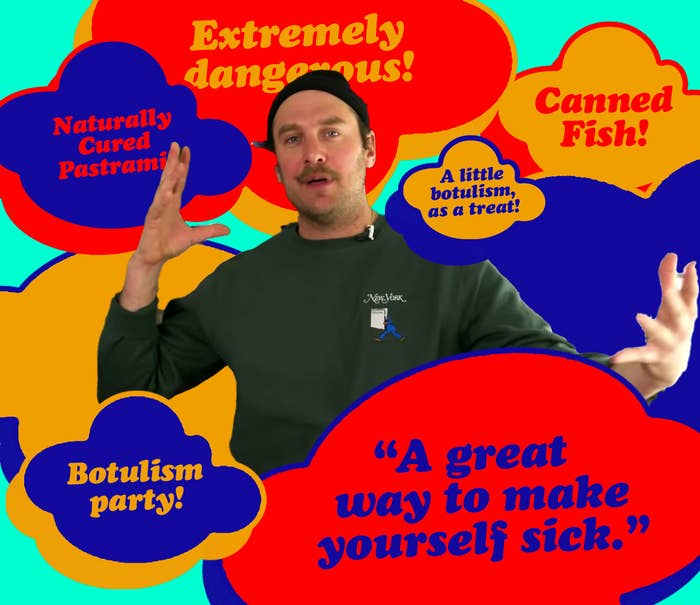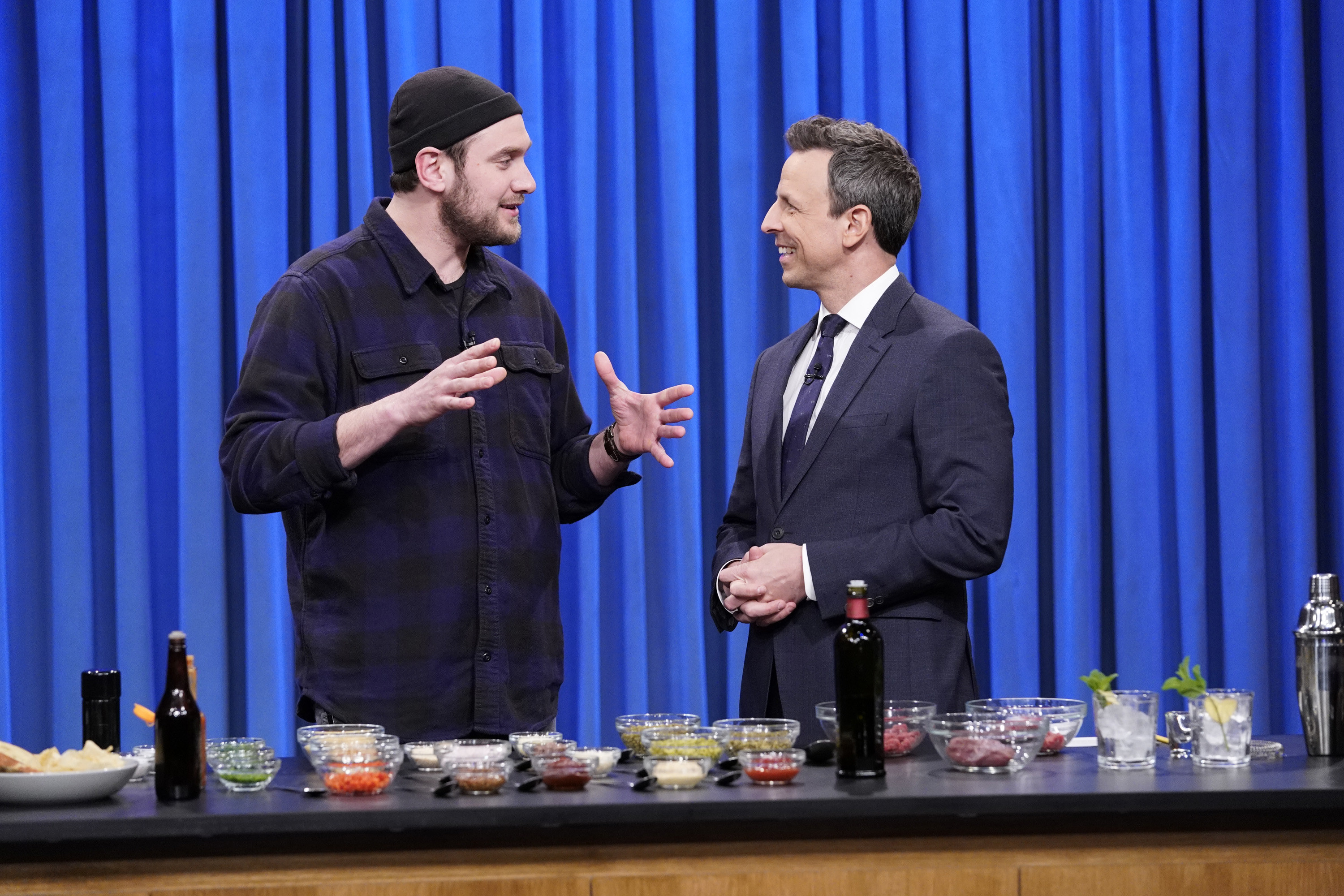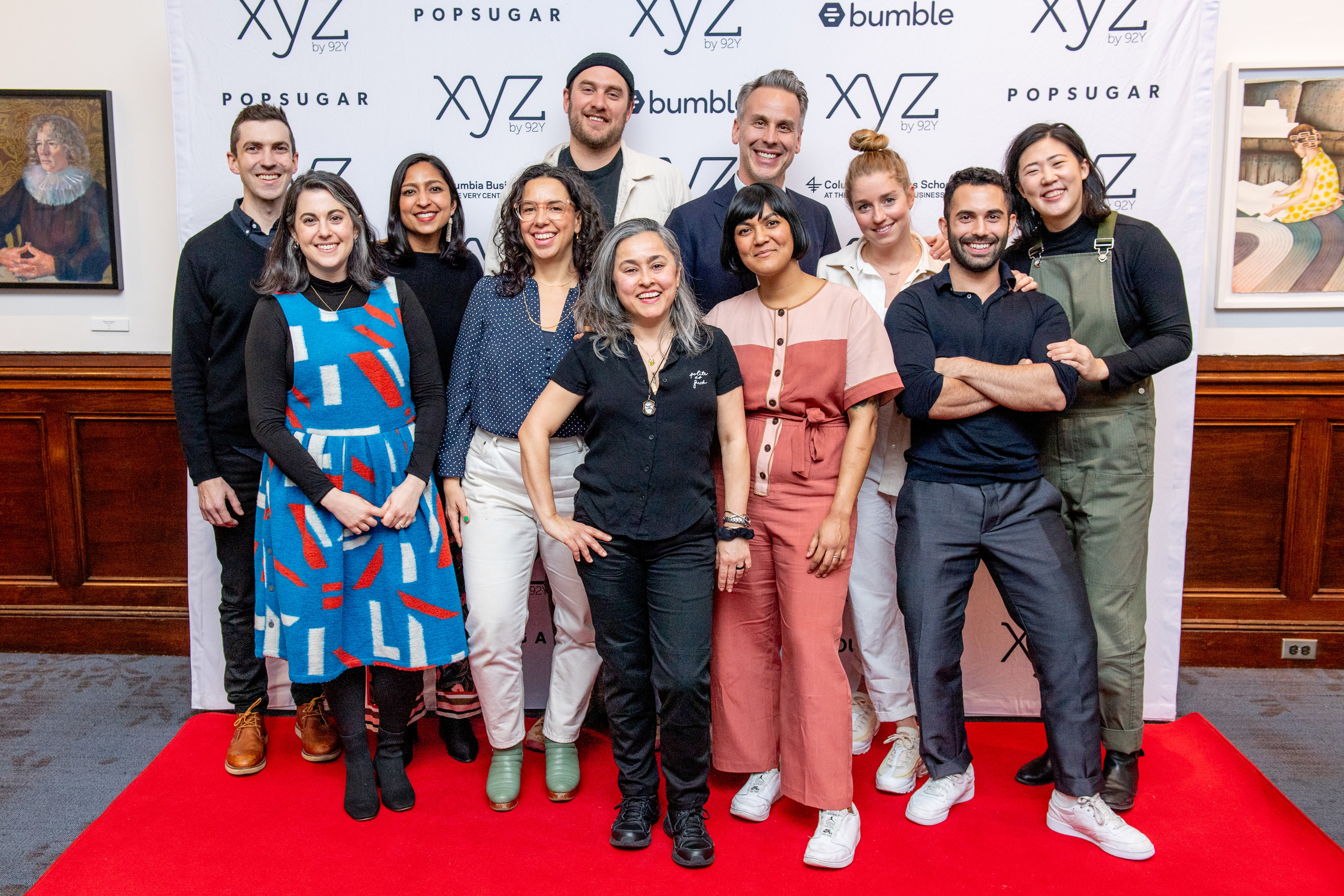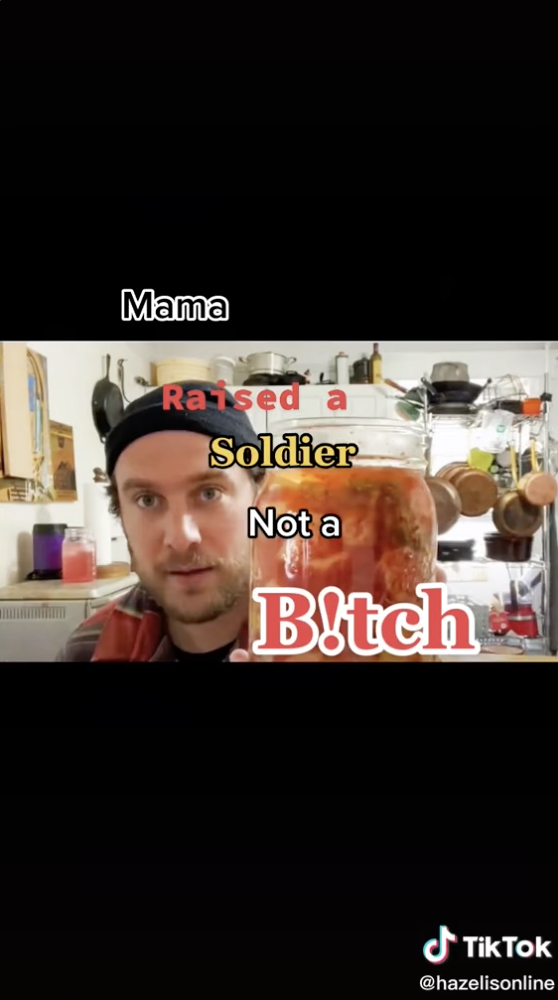
This is an excerpt from Please Like Me, BuzzFeed News’ newsletter about how influencers are battling for your attention. You can sign up here.
Part of the original appeal of the Bon Appétit Test Kitchen videos, for me anyway, was that even the most decorated chefs experiment and struggle to crack the perfect recipe for homemade pizza rolls sometimes.
But there’s a difference between burning a crust and perhaps putting your audience at risk of contracting a harmful bacteria, which some food experts argue that Brad Leone, host of the cooking series It’s Alive on BA’s YouTube channel, has done.
Though many of the BA Test Kitchen chefs dabble in food experimentation, Leone's work with raw meat and fermentation comes with more of a health risk than others. Even the name, It's Alive, positions Leone as an eccentric scientist who just so happens to work in a kitchen instead of a lab, and since 2016, millions of people have tuned in to see his beloved handsome goofball persona.
In February 2021, Bon Appétit removed a Leone video about seafood canning after viewers warned of a possible botulism risk. “I apologize and if you did see the recent it’s alive episode — please don’t water bath your cans,” he wrote on Instagram at the time. “I Apologize again and will do better as a teacher and student of food.” He joked about botulism in a June 2017 video, saying “no one has gotten botulism since 1920. That might be wrong.” (An editor’s note in a text overlay confirmed that he was, indeed, wrong.) Now, experts say they fear the same threat is present in the “Brad Makes Pastrami” video from April 4, where Leone says he wants to “experiment” with curing meat “naturally.”
There is now a disclaimer in the video description that says: “Although we all enjoy the discoveries that come with Brad's unique experiments in the kitchen, if you’re inspired to create your own version at home be sure to follow a tried and tested recipe so your preparations line up with food safety standards.” It’s far enough down that you’d have to click “see more” to read it, and it’s not present on any other of the more than 100 It’s Alive videos.
Which raises the question: Does it matter if a food influencer at a major publication makes experimental recipes that perhaps viewers shouldn’t re-create word for word? I spoke to chefs and food science experts to get their thoughts.
“This ain't it bro. Once again you're preaching unsafe methods,” wrote Jed Banta, a chef from California, on Leone’s Instagram post of his pastrami. Banta told BuzzFeed News that he understands the fellow chef’s desire to try new ideas, but worries viewers miss out on basic safety.
“He’s just diving in there like a labrador retriever at feeding time,” Banta said. “He has built this brand of ‘off-the-cuff himbo,’ and that’s great for a lot of things, but fermenting and curing are things that need precision and control.”
Leone’s pastrami experiment used a food preservation process that removes moisture and reduces the chances that any bacteria could grow inside it over time, using a blend of celery, salt, and sauerkraut.
Commenters called Leone’s attempt to cure meat in the video “disgusting,” “unsafe,” “extremely dangerous,” a “botulism party,” and “a great way to make yourself sick.” Chefs quizzed on the video said they didn't see any major food safety concerns in Leone's recipe.

Joe Rosenthal, a cooking hobbyist whose career as a mathematician has made him a stickler for detail, told BuzzFeed News that he worries viewers who attempt to replicate Leone’s process may put themselves at risk of botulism.
Botulism, a food poisoning caused by the botulinum bacterium that can grow on preserved food if it isn’t properly sterilized, is rare but deadly.
Rosenthal extensively highlighted what he sees as several areas of safety risk in the video in a series of Instagram stories. “Beyond the serious food safety issues, he has seriously misrepresented pastrami,” Rosenthal told me in a call last week.
We're following the influencers who want you to follow them. Sign up here for weekly dispatches from our Please Like Me newsletter.
Leone did not respond directly to a request to comment. When I asked Bon Appétit whether his video should be considered entertainment or educational, the publication sent me a statement: “Our safety practices are of utmost importance at Bon Appétit and we have many processes in place to ensure all content is accurate, fact-checked and safe for viewers,” it read. “Our culinary production team extensively reviews all of our video content to confirm they adhere to safety protocols. In addition, we have a fermentation expert who oversees our recipes for this series, including this video.”
The magazine declined to have its food safety expert address our itemized list of potential concerns about Leone’s pastrami video, so BuzzFeed News reached out to five different food safety experts who said that concerns about a botulism risk are valid.
Leanne Blommaert, an expert on health and safety for NSF International, a public health organization, told BuzzFeed News that when curing meat, replacing “standardized ingredients” with consistent levels of salt and nitrites can create unsafe conditions. According to Kelly Johnson-Arbor, a toxicologist and co–medical director of the National Capital Poison Center, there hasn’t been a single case of botulism linked to companies that use standardized curing methods since the use of sodium nitrite was authorized by the US Department of Agriculture in 1925.
A sixth expert, Jim Kincheloe, a food expert at the Center for Science in the Public Interest, said he wasn’t concerned about botulism but noted that the video doesn’t show Leone washing his hands after handling raw meat — an even more common food safety issue. There might be more precise food preparation going on behind the scenes, but if the audience doesn’t see them, they don’t always know to copy them.

When 10 of the 13 members of Bon Appetit’s on-camera crew announced that they would no longer appear in videos for the Test Kitchen brand following allegations of a “toxic” and “racist” culture present at the food magazine in summer 2020, Leone was one of the three who remained.
Sam, a former line cook who now runs the YouTube commentary channel We’re in Hell, told BuzzFeed News that one of the Bon Appétit channel’s great strengths at its peak was developing fun characters for their instructional cooking content.
“They marketed themselves almost as a sitcom with a cast of kooky characters,” he said. “I think part of why people were so upset with everything that happened.”
The channel lost 300,000 subscribers in the fallout according to Social Blade, but never stopped accruing more than 1.3 billion views every month.
Hazel Foerstner jokingly uploaded a TikTok in February 2022 that has been going viral alongside criticism of Leone’s pastrami video. In it, she responds to someone asking her if she’s afraid of getting botulism from her own fermented creations, to which she responds with text that says “Mama raised a soldier not a bitch” over photos of Leone.

She told BuzzFeed News she first learned how to make kombucha from his videos.
“I made that botulism joke before botulismgate, but it sure aged worse than Brad’s canned fish,” she said. “I got second sources for learning how to make kombucha because I have a brain.”
Some may argue that anyone who falls for influencer marketing deserves to face the consequences of their naivete. I agree that everyone needs to start being more skeptical of what beautiful, popular people sell to them, but we can hold influencers to a higher standard that removes the potential for alleged fitness scams or foodborne illness.
The “himbo food influencer” clearly appeals to a wider audience, but Leone benefiting from the style and sheen of a highly respected publication means an aspiring home cook might take him at face value. He might be the BA chef with the least professional persona — his own former coworker called him a “big dumb white guy” — but he’s also one of the most beloved.
There’s no evidence that anyone has gotten botulism or any other foodborne illness from one of Leone’s videos, but to me, this signals the opportunity to assess what “expert” influencers we trust in the food realm.

